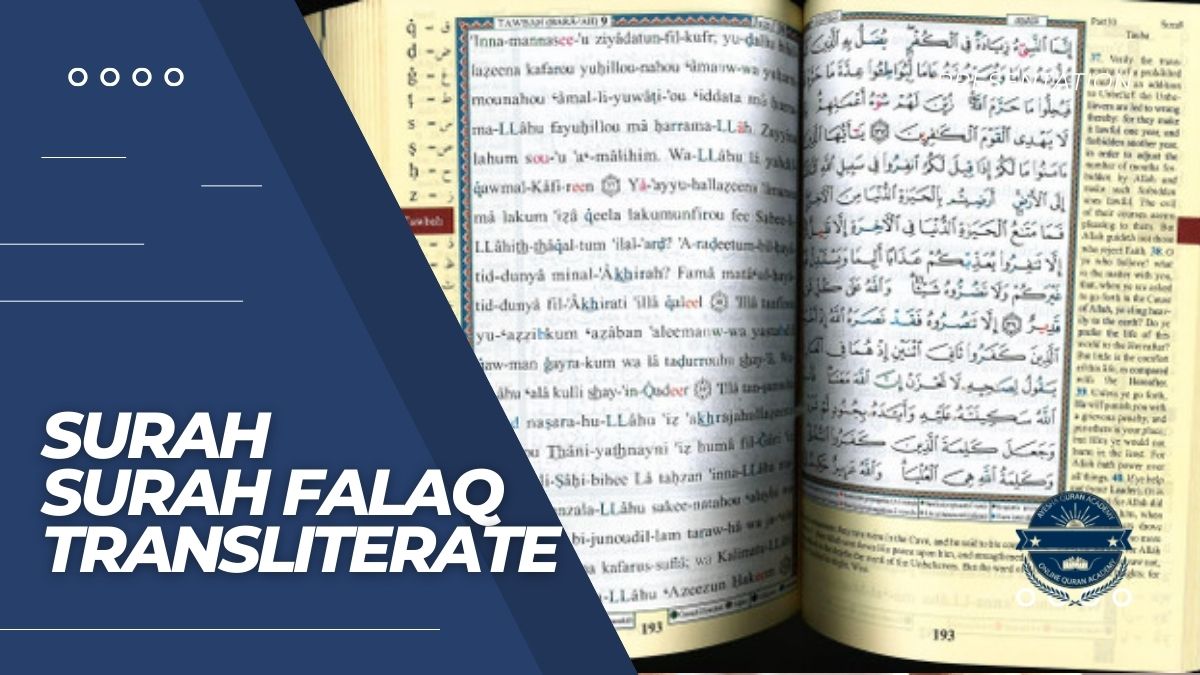Surah Falaq, also known as “The Daybreak” in English, is the 113th chapter (Surah) of the Holy Quran. This short yet profound Surah holds immense spiritual significance in Islam.
Surah Falaq consists of just five verses, making it one of the shorter chapters of the Quran. It is often recited in daily prayers and during times of seeking protection from harm and evil.
Transliteration of Surah Falaq
Bismillahir-Rahmanir-Raheem
1. Qul a’oodhu birabbil-falaq
2. Min sharri ma khalaq
3. Wa min sharri ghasiqin itha waqab
4. Wa min sharri an-naffathati fil ‘uqad
5. Wa min sharri hasidin izha hasad
Translation of Surah Falaq
With the name of Allah, the All-Merciful, the Very-Merciful.
- Declare, “I seek refuge with the Lord of the Dawn.”
- From the evil that He has made;
- And from the evil that the darkening (night) brings with it (or the moon when it sets or goes away).
- And from the evil of witchcraft as they blow in the knot
- And from the evil of the envier when he envies
Understanding the Verses of Surah Falaq
Now, let’s delve deeper into the meaning and significance of each verse within Surah Falaq:
Verse 1: Qul a’oodhu birabbil-falaq
This opening verse begins with the Arabic phrase “Qul a’oodhu birabbil-falaq,” which translates to “Say, ‘I seek refuge in the Lord of daybreak.'” Believers are instructed to declare their seeking of refuge in the Creator, specifically in the context of daybreak.
Daybreak represents a new beginning, a fresh start, and the dispelling of darkness. By seeking refuge in the Lord of daybreak, individuals acknowledge their dependence on God’s protection from the uncertainties and challenges that each new day may bring.
It is a profound reminder of our need for divine guidance and safeguarding in our daily lives.
Verse 2: Min sharri ma khalaq
The second verse, “Min sharri ma khalaq,” translates to “From the evil of what He has created.” This verse underscores the belief that all creation belongs to God, and He alone has the power to create and sustain. By seeking refuge from the evil of what God has created, individuals express their reliance on Him to protect them from harm, misfortune, and malevolent forces.
It reminds believers to view all aspects of creation, even those that may seem harmful or challenging, as ultimately under God’s control.
Verse 3: Wa min sharri ghasiqin itha waqab
In the third verse, “Wa min sharri ghasiqin itha waqab,” believers seek protection “From the evil of the darkness when it settles.” This verse alludes to the vulnerability that often accompanies darkness and the unknown. It serves as a reminder to seek God’s refuge from the perils that may arise during the night or from circumstances enveloped in obscurity. By invoking protection from the darkness when it settles, individuals express their trust in God’s ability to guide them through life’s darkest moments.
Verse 4: Wa min sharri an-naffathati fil ‘uqad
Verse four, “Wa min sharri an-naffathati fil ‘uqad,” seeks refuge “From the evil of those who blow on knots.” This verse addresses the practice of blowing on knots, which has historically been associated with sorcery or harmful intentions.
Believers invoke God’s protection from individuals who engage in such practices and express their faith in God’s ability to shield them from the harm that may be inflicted through these means.
Verse 5: Wa min sharri hasidin izha hasad
The final verse of Surah Falaq, “Wa min sharri hasidin izha hasad,” implores protection “From the evil of an envier when he envies.” Envy and jealousy can lead to negative thoughts and actions.
By seeking refuge from the harm caused by envy, individuals acknowledge the importance of maintaining goodwill, compassion, and positivity in their interactions with others. This verse serves as a reminder of the significance of fostering harmonious relationships and guarding against negative emotions.
The Significance of Surah Falaq
Spiritual Protection
Surah Falaq is primarily recited for spiritual protection. Its verses serve as a shield against various forms of harm, both physical and metaphysical. By seeking refuge in the Lord of daybreak and invoking protection from the evil of what God has created, believers express their dependence on divine guidance and safeguarding. This Surah reassures them that God’s protection is ever-present, offering solace in times of vulnerability.
Daily Practice
Surah Falaq is an integral part of daily prayers for many Muslims. It is recited during the Fajr (dawn) and Maghrib (evening) prayers and is often incorporated into the Sunnah (recommended) prayers.
This practice reinforces the idea that seeking God’s protection is essential at the beginning and end of each day, symbolizing a continuous reliance on God’s guidance throughout life.
Protection from Darkness
The Surah’s verses, especially “From the evil of the darkness when it settles,” highlight the need for protection during moments of darkness and uncertainty. It reminds believers that even in the darkest of times, God’s light can dispel fear and bring clarity. This verse encourages trust in God’s ability to navigate individuals through challenging situations.
Protection from Harmful Intentions
Surah Falaq’s verses “From the evil of those who blow on knots” and “From the evil of an envier when he envies” emphasize seeking protection from harmful intentions and negative energies.
It acknowledges that not all harm is physical; it can also manifest through jealousy, envy, or negative intentions. By reciting these verses, believers safeguard themselves from the unseen harm that may arise from such sources.
Unity and Community
Surah Falaq, along with Surah Nas (the 114th chapter of the Quran), is often recited together for comprehensive protection. This practice fosters a sense of unity among Muslims, as they collectively seek refuge in God’s protection.
It serves as a reminder that the Islamic community is bound by faith, and together, they find strength and security in God’s guidance.
Faith and Dependence on God (Allah)
The continuous recitation of Surah Falaq reinforces the fundamental Islamic principles of faith (Iman) and trust (Tawakkul) in God. It reminds believers that their well-being ultimately lies in God’s hands, encouraging them to place their trust in Him while taking the necessary worldly precautions.
Conclusion
In conclusion, Surah Falaq transliteration is a vital aspect of practicing Islam for non-Arabic speakers. Understanding the meaning behind the verses enhances their spiritual significance. By seeking refuge in the Lord of daybreak, we aim to safeguard ourselves from all forms of harm and negativity.


